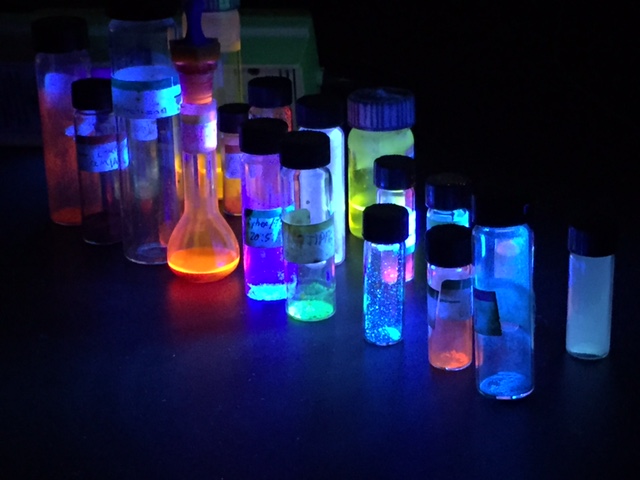The synthesis, characterization, and utilization of novel materials occupy a central role in modern science and technology. Materials chemistry is a highly interdisciplinary endeavor, which is exemplified by the diversity of our faculty conducting research in the field. Our interests include:
- Semiconductor materials
- New materials for solar cells and optoelectronics
- Nano/bio photonics and imaging
- Computational methods for modeling surfaces
- New strategies for applying the tools of nanotechnology to materials synthesis
- Imprinted polymer-materials for chemical and biochemical sensing
- Nanocarbon Materials

- Dr. Oliver M.R. Chyan: Microelectronic materials chemistry, plasma assisted functional thin-film materials, novel materials for alternative energy production and fuel cells
- Dr. Thomas R. Cundari: Multiscale modeling of metals in advanced materials including aerospace alloys, functionally graded materials, and metal-containing ceramics. Metal-based materials for light-emitting display devices.
- Dr. Francis D'Souza: Functionalization of nanocarbon materials for energy harvesting and storage applications; Imprinted polymer for chemical and biochemical sensing; ultra-fast spectroscopy.
- Dr. Teresa D. Golden: Materials and bioanalytical chemistry which includes: electrodeposition of nanomaterials; chromatography; corrosion protection coatings; forensic investigations.
- Dr. Jeffry A. Kelber: Atommic layer deposition, 2-D materials, oxides, plasma/surface interactions
- Dr. Shengqian Ma: Synthetic inorganic and organic materials research lab with focus on task-specific design and functionalization of nanoporous materials including metal-organic frameworks (MOF), covalent organic framework (COF) and porous organic polymer (POP) for applications in gas storage/separation, heterogeneous catalysis/biocatalysis/photocatalysis/electroctalysis, water treatment/environmental remediation, and drug delivery/bio-sensing.
- Dr. Mohammad A. Omary: Phosphorescent materials for lighting devices and sensors, black absorbers for solar cells, unipolar semiconductors for molecular transistors, and metal-organic frameworks for gas storage
- Dr. Guido F. Verbeck, IV: Microscale analysis of material surfaces utilizing micromanipulation coupled with nanospray mass spectrometry.
- Dr. Hong Wang: Asymmetric catalysis through cooperative enamine-metal acid catalysis; functional organic materials based on pi-extended porphyrins; development of small molecule inhibitors targeting STAT3.
- Dr. Hao Yan: Dr. Yan's group seeks novel physical approaches to address fundamental questions in chemistry and materials science. We are particularly interested in elucidating structure-property relationships under extreme mechanical environments such as high hydrostatic pressure (HHP), and applying such knowledge to the design of functional systems with broad-range impacts in catalysis, energy conversion and quantum information science.
- Dr Hsin-Yu Ko: First-principles condensed-phase chemistry research group. Investigating atomistic structures and reactive processes relevant to energy, materials, and environmental sciences. Developing ab initio algorithms and software using high-performance computing and machine learning techniques. Systems of interest: e.g., fuel cells, forever chemicals, polymers.
